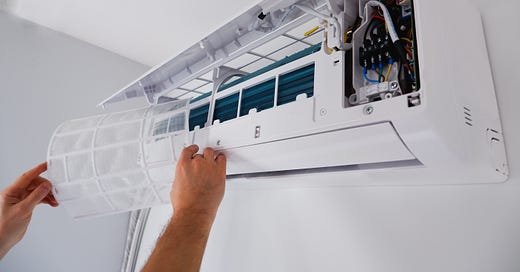Air Conditioning Businesses Are Hot
The HVAC industry isn’t slowing down any time soon.
It’s the heart of air conditioning season, and one of the greatest beneficiaries of this time of year are the AC companies powering our homes, offices, and other businesses. You could say that the HVAC biz is on fire.
Rising temperatures amid a warming climate have meant growing sales for many firms in the HVAC industry. There are no signs of the industry slowing down, as this summer is shaping up to be one of the hottest on record (last year was the hottest, per NASA). Some parents even suggest their kids enter the business, which is expected to soar in the coming decades.
The global stock of air conditioners in buildings is forecast to grow from 1.6 billion to 5.6 billion by 2050, according to the International Energy Agency. The AC market has grown 7% per year over the past decade.
This summer the demand for air-conditioner replacements in the U.S. has surged due to record-breaking heat. Temperatures exceeded 100 degrees throughout the country, and over 150 million people were under heat alerts in July.
Staying busy: Some HVAC businesses are struggling to meet the demand, and much of their work amid the record-breaking heat is centered on emergency repairs, often involving poorly maintained or old units. Some contractors are working 12-14 hour days, using cooling vests and magnetic umbrellas to cope with the heat. Supply-chain issues from the pandemic continue to affect the industry, too.
Demand for energy-efficient cooling options, like heat pumps, has kept businesses busy. One HVAC CEO said, “It’s always changing, and that, in turn, keeps us busy, which is a good thing… tell my guys, ‘This is what we’ve been looking for. We have three months to bring in the harvest.’ So we have to endure hardship, and the hardship is the heat.”
The HVAC industry isn’t tiny. In the U.S., it generates around $150 billion in annual revenue and employs over 1.5 million people. Employment for HVAC mechanics, installers, designers, and engineers is expected to keep growing rapidly.
Smart HVAC systems, green and sustainable tech, and AI are being adopted more widely. The goal is to enhance efficiency and reduce operational costs.
Residential HVAC services comprise over 50% of the U.S. market, followed by commercial services at over 30% and industrial services at 20%.
A heat pump is an appliance that uses electricity to heat and cool a building by moving heat from one place to another. They’re energy-efficient alternatives to air conditioners and furnaces and can be used in all climates — heat pumps are two appliances in one because they heat and cool your home. Though the upfront cost is higher, they lower homeowners’ utility bills — something many homeowners are seeking as temperatures keep rising.





